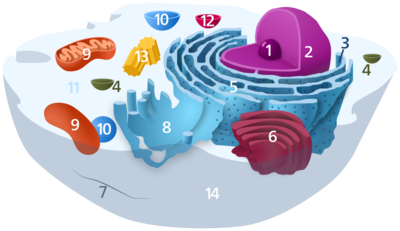Vesicle (biology)
|
|
In cell biology, a vesicle is a relatively small and enclosed compartment, separated from the cytosol by at least one lipid bilayer. Vesicles store, transport, or digest cellular products and wastes.
This biomembrane enclosing the vesicle is the same as that of the outer cellular membrane. Thus, because of the separation, the intravesicular environment can be made to be different from the cytosolic environment. Vesicles are a basic tool of the cell for organizing metabolism, transport, enzyme storage, as well as being chemical reaction chambers. Many vesicles are made in the Golgi apparatus, but also in the endoplasmic reticulum, or are made from parts of the plasma membrane.
Some types of vesicles
Transport vesicles can move molecules between locations inside the cell, e.g., proteins from the Rough Endoplasmic Reticulum to the Golgi Apparatus.
Synaptic vesicles located at presynaptic terminals in neurons store neurotransmitters.
Lysosomes (membrane-bound digestive vesicles) can digest macromolecules (break them down to small compounds) that were taken in from the outside of the cell by an endocytic vesicle.
Vesicle coat
The vesicle coat serves to sculpt the curvature of a donor membrane, and to select specific proteins as cargo. It selects cargo proteins by binding to sorting signals. In this way the vesicle coat clusters selected membrane cargo proteins into nascent vesicle buds.
See also:
| Organelles of the cell |
|---|
| Chloroplast | Mitochondrion | Centriole | Endoplasmic reticulum | Golgi apparatus | Lysosome | Myofibril | Nucleus | Peroxisome | Ribosome | Vacuole | Vesicle |

